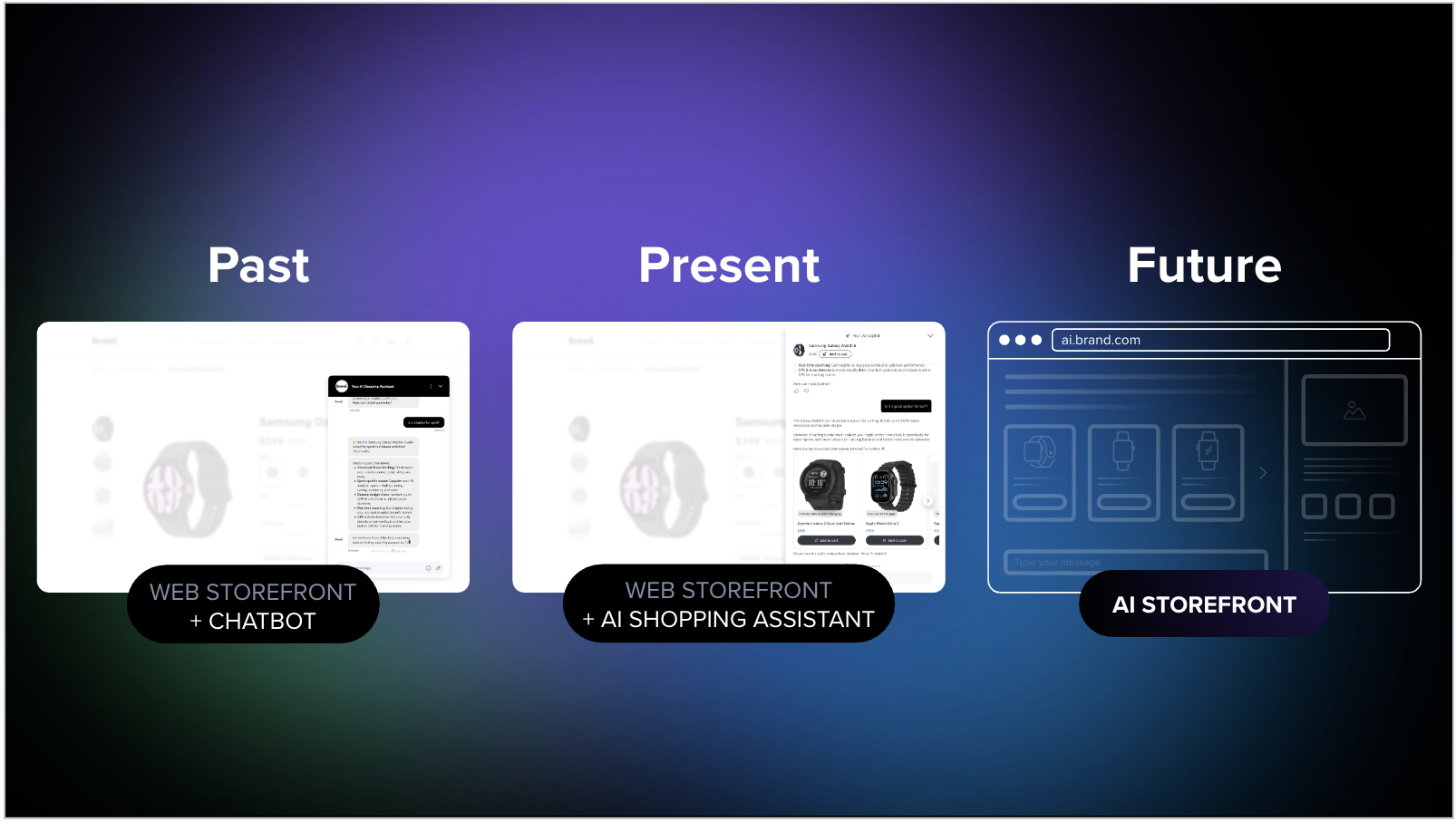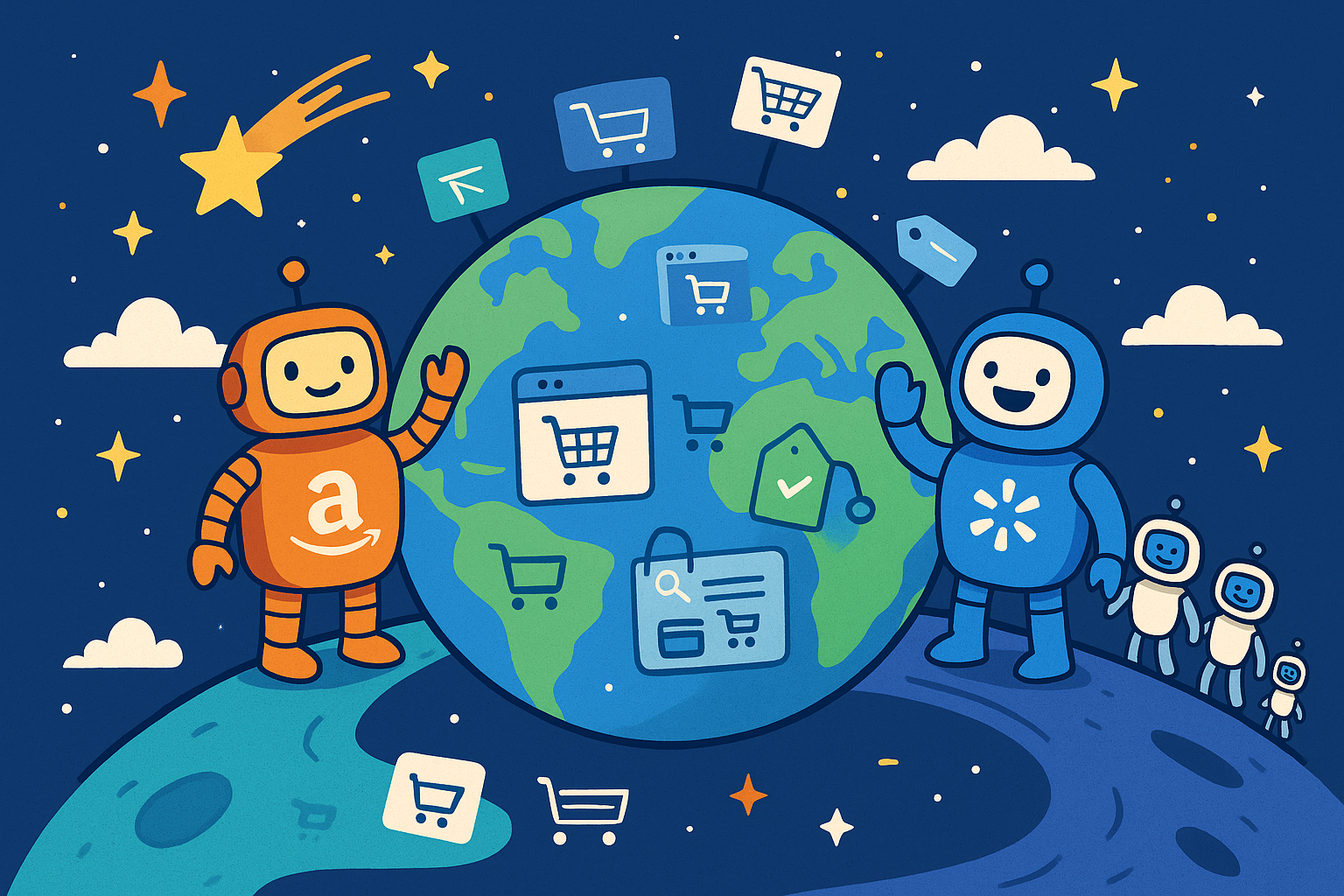4 Ways to Improve the E-commerce Experience With An AI Shopping Assistant
iAdvize

In today's fast-paced digital age, e-commerce continues to change how we shop. The sector is expected to grow by 8.8% in 2024, reaching a staggering $6.3 trillion globally. However, as the market expands, so do consumer expectations. Modern shoppers demand personalized, efficient, and seamless experiences. Enter artificial intelligence-backed shopping assistants—advanced chatbots designed to meet these demands head-on.
The Rise of AI Shopping Assistants
As generative AI and large language models (LLMs) evolve, the capabilities of AI shopping assistants have expanded. Bloomberg forecasts that the demand for generative AI could inject an additional $280 billion into the software market, with specialized virtual shopping assistants forming a $20 billion market by 2027 and swelling to $89 billion by 2032.
The transformative potential of these tools is immense, reshaping how consumers expect to interact with a company through their online channels and setting new standards for customer service and engagement.
What is an AI Shopping Assistant?
An AI shopping assistant is an advanced chatbot powered by generative AI. This tool leverages natural language processing (NLP), machine learning algorithms, and vast data sets to understand and respond to customer inquiries in real time, with accurate, tailored answers that are specific to each consumer.
Unlike traditional chatbots, AI shopping assistants are all inclusive, and have new features that enable them to engage in meaningful conversations, provide helpful product suggestions, advice, and comparisons, and guide users through their buyer journey from product discovery to post-purchase support.
Key Benefits of Implementing AI Shopping Bots Onto Your Website
Increased Conversion Rates
New-generation AI models significantly improve conversion rates by providing tailored recommendations and creating a customer experience that helps shoppers discover, choose, and buy the right products for them.
Brands that have integrated an AI shopping assistant into their online platform over the past year have seen impressive results—like up to an 8x increase in their conversion rate. By understanding customer preferences and delivering relevant suggestions, AI shopping assistants can boost your revenue by turning casual browsers into loyal customers.
Enhanced Customer Experience
Customer satisfaction is paramount in e-commerce. An AI shopping bot excels at delivering exceptional customer service by offering real-time support, answering questions, and resolving issues quickly.
According to an Ipsos study, 90% of Americans prefer to contact a brand via online chat or messaging, with this figure jumping to 94% among 18-34 year olds. AI shopping assistants meet this demand by providing a seamless and efficient communication channel, consistently responding to requests with accurate and helpful information that boosts customer satisfaction.
Cost Efficiency and Scalability
Traditional customer service can be resource-intensive, requiring significant manpower and operational costs. AI shopping assistants offer a cost-effective alternative, as they’ve been proven to automate up to 74% of the communication activity that happens on your website.
This automation leads to significant cost savings and allows businesses to scale their customer service operations without compromising quality. Additionally, AI assistants are always on, ensuring customers receive support whenever they need it.
Applications of AI Shopping Bots in E-commerce
1. Product Discovery and Recommendations
One of the most compelling applications of AI shopping assistants is in product discovery and recommendations. Leveraging generative AI and extensive product databases, these assistants can provide highly personalized suggestions. In an online environment where 37% of shoppers highlight access to a wide range of products as their main reason for buying, having a tool that can quickly navigate this vast selection is invaluable.
2. Real-Time Customer Support
Real-time customer support is crucial for any online platform. AI shopping assistants can handle a wide range of customer requests, from product information and availability to order tracking and returns. By providing instant responses, these assistants reduce wait times and improve customer satisfaction.
3. Streamlined Checkout Process
A smooth and efficient checkout process is vital for reducing shopping cart abandonment rates. AI assistants can guide customers through the checkout process, addressing any issues or concerns that may arise without need to navigate away from the purchasing screen. They can also offer payment options, apply discounts, and ensure a seamless transaction. The results of a streamlined checkout process are more revenue potential and a higher conversion rate.
4. Data-Driven Insights
Chatbots for e-commerce, like AI shopping assistants, generate a wealth of data that can be leveraged for business optimization. By analyzing customer interactions, preferences, and behaviors, businesses can gain valuable insight into their target audience. This conversational context can inform marketing strategies, product development, and inventory management. And if you need more insights, you can also take a look at these 30 online shopping statistics.
Use Cases: Success Stories of AI Shopping Assistants
Payne Glasses
Payne Glasses is a provider of lifestyle eyeglass lenses and frames that leveraged artificial intelligence to enhance their online shopping experience for both their site visitors and customer service agents.
This collaboration underscores the brand’s commitment to leveraging innovative technology to facilitate a seamless shopping journey, ensuring that every interaction on their website is tailored to the consumer.
IKKS
French fashion brand, IKKS, embraced messaging in 2017 to enhance customer support on its website, offering tailored advice and interactions akin to in-store shopping experiences.
By September 2023, due to the increasing volume of site visitor interactions and the need to manage costs more effectively, the brand sought to find an innovative solution for automating its messaging strategy.
That’s when IKKS turned to an AI Copilot, confident in the technology’s ability to deliver quality customer experiences that surpass those provided by older-generation chatbots (NLU).
The Future of AI Shopping Assistants
Integration with Augmented Reality (AR)
The future of AI shopping assistants lies in their integration with emerging technologies. Augmented reality (AR) is one example of this, where it can enhance the shopping experience by allowing customers to visualize products in their real-world environment.
For example, AI shopping assistants can offer virtual try-ons for clothing or preview furniture in a customer’s home. This integration can bridge the gap between online and in-store shopping, providing a more immersive, interactive, and omnichannel experience.
Voice-Activated Shopping Assistants
Voice-activated AI shopping assistants are another promising development. These assistants can provide hands-free, conversational shopping experiences, similar to Amazon's Alexa or Google Assistant. By leveraging voice recognition technology, AI shopping assistants can understand and respond to verbal commands, making the shopping process more convenient and efficient.
Advanced Personalization
Advanced personalization is the key feature that makes AI shopping assistants so successful. They’re able to deliver highly tailored recommendations and customer service at scale. For instance, AI shopping assistants can analyze past purchase history, browsing behavior, and preferences to offer personalized product suggestions, promotions, information, and comparisons. This level of personalization can significantly enhance customer loyalty and drive repeat purchases.
Embracing the AI Revolution in the Online Buyer Journey
The integration of AI shopping assistants into e-commerce is not just a trend but a paradigm shift. As the statistics and case studies demonstrate, AI shopping assistants have the potential to transform the online shopping experience, drive higher conversion rates, enhance customer satisfaction, and reduce operational costs. It will be important for e-commerce brands to embrace this technology going forward in order to stay competitive in the ever-evolving market.
Generative AI and AI shopping assistants are reshaping the e-commerce landscape. With the ability to provide personalized recommendations, real-time support, and data-driven insights, these intelligent tools are revolutionizing how businesses interact with their customers. As AI technology continues to advance, the possibilities for enhancing the e-commerce shopping experience are limitless.
Virtual shopping assistants offer a wealth of benefits for e-commerce businesses, from increased conversion rates and enhanced customer experiences to cost efficiency and scalability. By leveraging this technology, businesses can stay ahead of the curve and deliver exceptional value to their customers. The future of e-commerce is here, and it's powered by AI.

.png)
.png)







